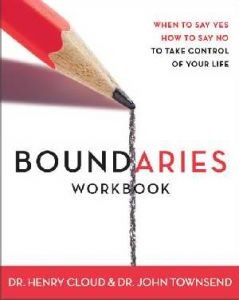empty
|
Shopping Cart
Boundaries Workbook: When to Say Yes, When to Say No to Take Control of Your Life
ISBN: 0310494818
EAN: 9780310494812
Based on the best-selling, award-winning book by Drs. Cloud and Townsend, this is a psychological survival manual that will give you biblically based answers to questions you have about setting and maintaining boundaries.
- Paperback
Contents Preface Session 1: What Is a Boundary? Session 2: Understanding Boundaries Session 3: The Laws of Boundaries, Part I Session 4: The Laws of Boundaries, Part II Session 5: Myths About Boundaries Session 6: Boundary Conflicts, Part I Session 7: Boundary Conflicts, Part II Session 8: Boundary Successes, Part I Session 9: Boundary Successes, Part II
Session One What Is a Boundary? Overview In this session you will ¿ Define what boundaries are ¿ and why they are important ¿ Identify some examples of boundaries ¿ Find out what we are responsible for within our boundaries ¿ Learn that the concept of boundaries comes from the nature of God himself ¿ Discover how boundaries result in freedom, which leads to love Video Segment Sherrie Without Boundaries ¿ Sherrie is trying to do a good job with her marriage, her children, her job, her relationships, and her Lord. Yet it¿s obvious that something isn¿t right. Life isn¿t working. ¿ Sherrie isn¿t able to draw and maintain boundaries around what is hers, boundaries that would help keep out what isn¿t hers. ¿ In the physical world, boundaries are easy to see, and they give the message: THIS IS WHERE MY PROPERTY BEGINS. The owner of the property is legally responsible for what happens on his or her property. Nonowners are not responsible for the property. ¿ Just as homeowners set physical property lines around their property, we need to set mental, physical, emotional, and spiritual boundaries for our lives to help us distinguish what is our responsibility and what isn¿t. ¿ A variety of things, including past hurts, poor models, and misunderstood Christian teachings, cause weak boundaries or boundaries that don¿t exist at all. ¿ Boundaries define what is me and what is not me. A boundary shows where each individual ends and someone else begins, leading each person to a sense of ownership and responsibility. Boundaries also protect us from the bad. Let¿s Talk Examples of Boundaries and the Responsibilities That Come with Them Directions 1. The leader will split the large group into seven small groups and assign each group a cluster from one of the lists found on pages 12¿13. 2. If your group is assigned some examples of boundaries, talk about why each is considered a boundary and what people can do to keep that particular boundary strong. 3. If your group is assigned some of the responsibilities that come with boundaries, talk about what being responsible for each of these areas involves or (perhaps an easier question to answer) what irresponsibility in each area looks like. 4. When you come back together as a large group, a spokesperson from each small group will share your group¿s ideas with the others. 5. You¿ll also notice some ¿Boundary Building¿ questions at the end of each page. These important questions¿intended for later¿can help you build healthy boundaries for yourself. 6. You will have 8 minutes to complete this exercise. Examples of Boundaries Cluster A: Skin (What good does skin keep in and what bad does it keep out?); words (especially the word no) Cluster B: Truth (about God and about who you are); time (as in ¿time away from¿) Cluster C: Geographical distance (removing yourself from a situation); emotional distance (guarding your heart) Cluster D: Other people (How can other people help you set and keep boundaries?); consequences (Why are consequences necessary to strong boundaries?) Boundary Building 1. Think of a time when you stuck by your boundary in a particular area and people honored it. (What were the circumstances? Why were you able to maintain your boundary? How did people respond? What did you learn from this experience?) Consider what hinders you from keeping each boundary strong. (Look back at a time when someone did not honor a boundary you set and try to identify why that happened.) 2. Now consider the list of boundaries from another perspective. Which boundaries, when set by other people, do you need to do a better job of honoring? Why might you have a hard time honoring people¿s boundaries, especially certain ones? What will you do to be more respectful of the boundaries of the people in your life? Responsibilities That Come with Boundaries Cluster E: Feelings, attitudes/beliefs, desires Cluster F: Behaviors, choices, values, thoughts Cluster G: Limits, talents, love/trust Boundary Building 1. What do you tend to do with your feelings (especially anger) ¿ ignore them or let them be in charge? Why do you think you respond in the way you do? 2. Which attitudes and beliefs do you hold that are causing you to make poor choices or experience pain? What will you do to get those attitudes and beliefs in line with God¿s truth? 3. Paul says, ¿A man reaps what he sows¿ (Gal. 6:7 ). When has someone interrupted the law of sowing and reaping in your life and protected you from consequences that could have been good teachers? What happened? 4. What choices in your life have you failed to take responsibility for? Whom are you blaming for what circumstances of your life? 5. When have you been caught up in valuing the approval of people rather than the approval of God (John 12:43)? What lesson did you learn from that experience or from seeing someone else caught in that trap? 6. Where in your life today would you do well to limit your exposure to someone? What is keeping you from doing so? What destructive desires do you need to learn to say no to? What good desires do you need to learn to say no to because the timing isn¿t right? 7. What talents, gifts, and abilities are you currently exercising? What talent, gift, or ability are you afraid to exercise? What step will you take to overcome that fear? 8. Name one area of your life in which you would do well to think through some issues for yourself. What are you doing to grow in your knowledge of God and his Word? Whom are you expecting to be able to read your mind? To whom are you afraid to communicate your thoughts? What do you think keeps you from doing so? 9. When have you experienced the fulfillment of a God-given desire? Be specific about the circumstances and your feelings. What desires are you currently pursuing that your heavenly Father, wise parent that he is, is probably not interested in giving you? 10. How healthy is the inflow of love in your life? What healthy, godly relationships nurture you? How healthy is the outflow of love in your life? Where are you giving to others the kind of unconditional love God has given you?



